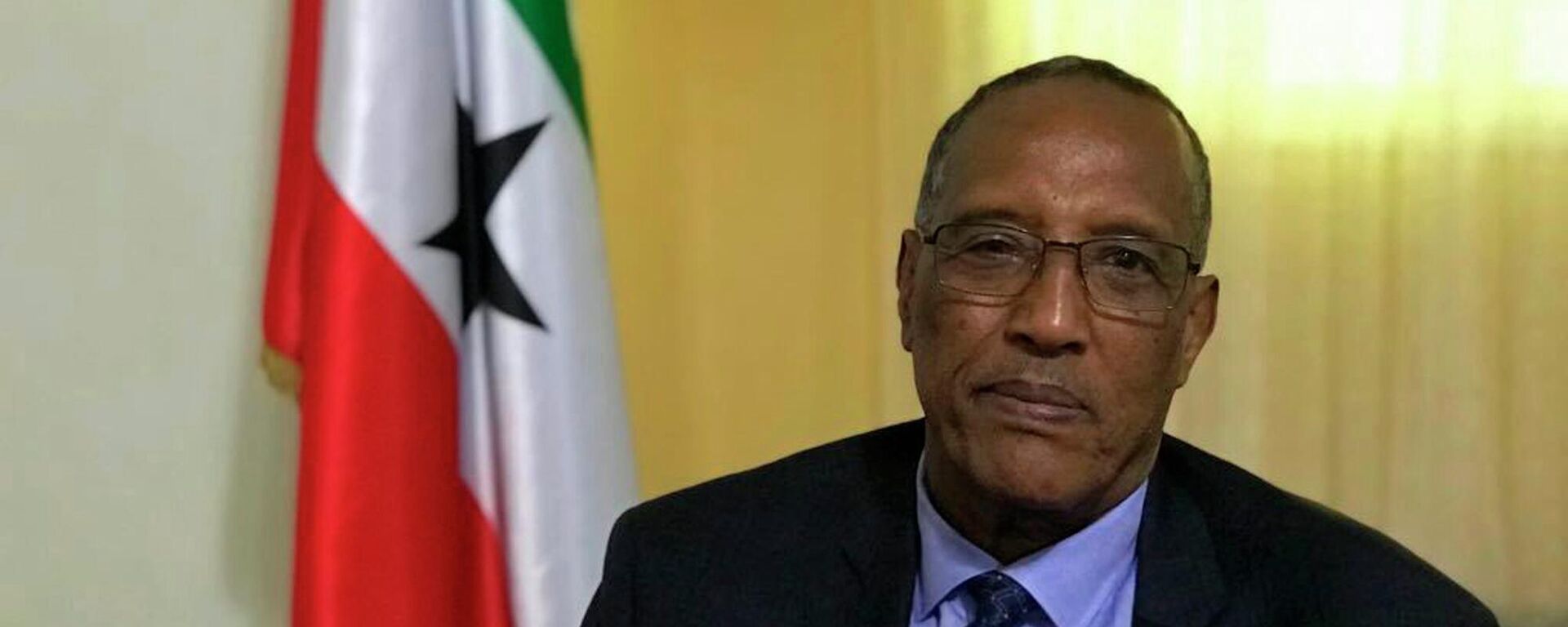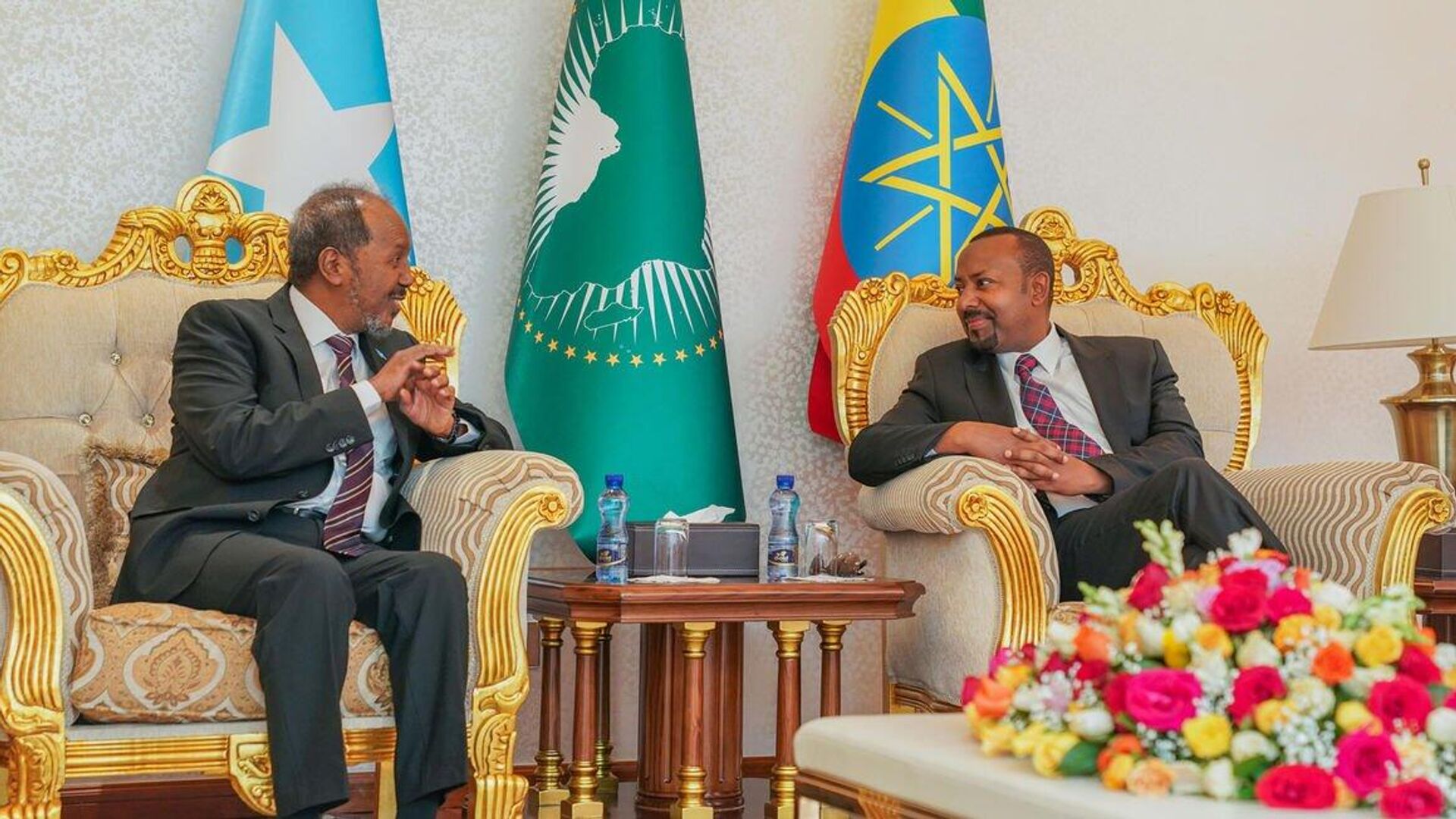https://sputnikglobe.com/20221002/ex-regional-rivals-ethiopia-somalia-ink-cooperation-pact-ask-un-to-lift-arms-embargo-on-mogadishu-1101433975.html
Ex-Regional Rivals Ethiopia, Somalia Ink Cooperation Pact, Ask UN to Lift Arms Embargo on Mogadishu
Ex-Regional Rivals Ethiopia, Somalia Ink Cooperation Pact, Ask UN to Lift Arms Embargo on Mogadishu
Sputnik International
Relations between the neighbors on the Horn of Africa have been complicated by decades of military confrontation caused by the legacy of European colonialism... 02.10.2022, Sputnik International
2022-10-02T11:23+0000
2022-10-02T11:23+0000
2022-11-14T13:36+0000
africa
somalia
ethiopia
relations
ties
agreement
east africa
https://cdn1.img.sputnikglobe.com/img/07e6/0a/02/1101433830_1:0:1160:652_1920x0_80_0_0_03f9d59545d8fa4ab597b8aa8628cf45.jpg
Ethiopian Prime Minister Abiy Ahmed and Somali President Hassan Sheikh Mohamud have signed a ten-point cooperation agreement aimed at strengthening bilateral ties.The communique, issued Friday after the conclusion of Mohamud’s two-day visit to Addis Ababa, included a pledge “to nurture and strengthen the longstanding bilateral ties and relationships between the two countries and peoples based on respect for the territorial integrity and sovereignty of both countries.”The 1992 embargo, imposed after the US-backed Somali government of Mohamed Siad Barre crumbled and the country became a failed state, was aimed at preventing military equipment from being sold to Somali warlords. But it has remained in place for decades afterward, barring a few exceptions, even after a Transitional Federal Government was created in 2004, and after an internationally recognized federal government of Somalia was established in 2012.The leaders also “emphasized the importance of expanding cooperation in the areas of trade, economy and infrastructure as well as communications in addition to the well-established political and security collaborations.”The meeting between Ahmed and Mohamud was the first since Mohamud’s election in May. The two leaders agreed to continue regular talks and to collaborate at regional venues to promote common interests.The cordial relations enjoyed between Ethiopia and Somalia today became possible despite decades of conflict in the 20th century stemming from the legacy of Italian and British colonialism and quarrels over the Ogaden – a region of eastern Ethiopia consisting predominantly of ethnic Somalis. Tensions spilled over into several rounds of guerilla warfare and state-to-state warfare in the 1960s and 1970s. In the late 1970s, the United States took advantage of tensions between Ethiopia and Somalia’s socialist governments over the Ogaden to back Mogadishu’s push to conquer the region and create a ‘greater Somalia’. The USSR and Cuba backed Ethiopia, which led to the collapse of the Somali offensive. Lopsided militarization of the country and the disorganization and demoralization of the Somali army helped spark a civil conflict in Somalia in the late 1980s which ultimately led to the collapse of the central government in 1992.Ethiopian-Somali relations gradually began to be restored in the mid-2000s, with Addis Ababa – itself rebuilding from conflicts which began with the collapse of the Derg government in the early 90s, assisting its neighbor along with the UN in rebuilding a central government.* A terrorist group outlawed in Russia and many other countries.
https://sputnikglobe.com/20221002/somaliland-presidents-term-extended-as-result-of-parliamentary-vote-1101428004.html
africa
somalia
ethiopia
east africa
Sputnik International
feedback@sputniknews.com
+74956456601
MIA „Rosiya Segodnya“
2022
News
en_EN
Sputnik International
feedback@sputniknews.com
+74956456601
MIA „Rosiya Segodnya“
Sputnik International
feedback@sputniknews.com
+74956456601
MIA „Rosiya Segodnya“
somalia, ethiopia, relations, ties, agreement, east africa
somalia, ethiopia, relations, ties, agreement, east africa
Ex-Regional Rivals Ethiopia, Somalia Ink Cooperation Pact, Ask UN to Lift Arms Embargo on Mogadishu
11:23 GMT 02.10.2022 (Updated: 13:36 GMT 14.11.2022) Relations between the neighbors on the Horn of Africa have been complicated by decades of military confrontation caused by the legacy of European colonialism and Cold War-era rivalries. In the 21st century, relations gradually began to improve, with Addis Ababa assisting in the United Nations mission to rebuild Somalia's state institutions.
Ethiopian Prime Minister Abiy Ahmed and Somali President Hassan Sheikh Mohamud have signed a ten-point cooperation agreement aimed at strengthening bilateral ties.
The communique, issued Friday after the conclusion of Mohamud’s two-day visit to Addis Ababa, included a pledge “to nurture and strengthen the longstanding bilateral ties and relationships between the two countries and peoples based on respect for the territorial integrity and sovereignty of both countries.”
The document also features a joint request asking the United Nations Security Council to lift the arms embargo slapped on Ethiopia in 1992. The two countries stated that lifting the embargo would allow Mogadishu to adequately equip itself to address security threats posed by Al-Shabab, the al-Qaeda-linked* terror group operating across wide swathes of Somalia, Ethiopia and Kenya.
The 1992 embargo, imposed after the US-backed Somali government of Mohamed Siad Barre crumbled and the country became a failed state, was aimed at preventing military equipment from being sold to Somali warlords. But it has remained in place for decades afterward, barring a few exceptions, even after a Transitional Federal Government was created in 2004, and after an internationally recognized federal government of Somalia was established in 2012.
Friday’s communique also stressed the need for Ethiopia and Somalia to “work together, minimize the effects of undue external interferences that could potentially undermine their joint effort for peace and stability in the region and effectively combat terrorism.”
The leaders also “emphasized the importance of expanding cooperation in the areas of trade, economy and infrastructure as well as communications in addition to the well-established political and security collaborations.”
The meeting between Ahmed and Mohamud was the first since Mohamud’s election in May. The two leaders agreed to continue regular talks and to collaborate at regional venues to promote common interests.

2 October 2022, 09:16 GMT
The cordial relations enjoyed between Ethiopia and Somalia today became possible despite decades of conflict in the 20th century stemming from the legacy of Italian and British colonialism and quarrels over the Ogaden – a region of eastern Ethiopia consisting predominantly of ethnic Somalis. Tensions spilled over into several rounds of guerilla warfare and state-to-state warfare in the 1960s and 1970s. In the late 1970s, the United States took advantage of tensions between Ethiopia and Somalia’s socialist governments over the Ogaden to back Mogadishu’s push to conquer the region and create a ‘greater Somalia’. The USSR and Cuba backed Ethiopia, which led to the collapse of the Somali offensive. Lopsided militarization of the country and the disorganization and demoralization of the Somali army helped spark a civil conflict in Somalia in the late 1980s which ultimately led to the collapse of the central government in 1992.
Ethiopian-Somali relations gradually began to be restored in the mid-2000s, with Addis Ababa – itself rebuilding from conflicts which began with the collapse of the Derg government in the early 90s, assisting its neighbor along with the UN in rebuilding a central government.
* A terrorist group outlawed in Russia and many other countries.





